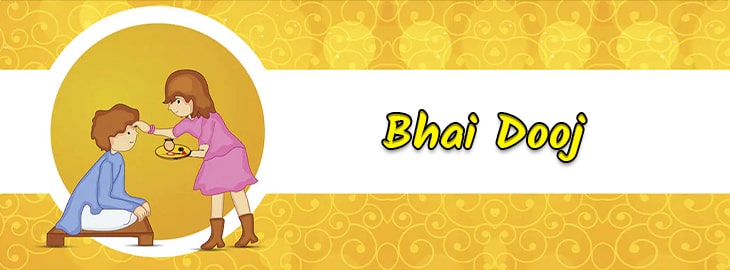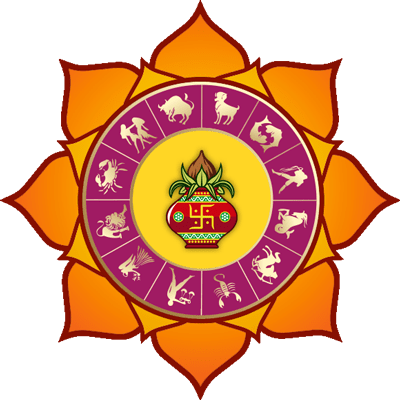
Bhai Dooj
Get Bhai Dooj 2024 date for New Delhi, India. Bhai Duj is the day to commemorate the sibling bond. Sisters put Tilak on their brother's forehead. Happy Bhai Dooj!
Bhai Dooj 2024
When is Bhai Dooj in 2024?
Sun
03rd
Nov
Bhai Dooj Muhurat For New Delhi, India
Bhai Dooj Tilak Time :13:10:27 to 15:22:18
Duration :2 Hour 11 Minute
The festival Bhai Dooj is the one that signify the special connection between a brother and a sister. The bond which unlike any other, stands out from the rest in its own and special way. This special connection is also known as Bhai Teeka, Yam Dwitiya, Bhrat Dwitiya etc. Bhai Dooj generally falls on the dark lunar fortnight, in the month of Kartik. This date falls right after Diwali, 2 days to be exact. On this time, the sister’s apply a Tilak and pray for the long life for their brothers. The Brother returns the favor by bring her present and gifts for all the toils the sister does for him. On Bhai Dooj, people venerate and worship the god of death Yamraj. As per the traditional beliefs, the god of death Yamraj was on hand to answer her sister’s call as he paid her a visit for lunch.
Customs and Vidhi’s about Bhai Dooj
Bhai Dooj is celebrated on the 2nd day of the dark lunar fortnight. Its calculation can be done by any of the following methods.
- As per the scriptures, if the 2nd day of the dark lunar fortnight of the Kartik month lies in the 4th quarter of the day, then we celebrate Bhai Dooj on this date. If on both days Dwitiya Tithi touch afternoon, then Bhai Dooj should be celebrated on the next day. Other than this, if on both the days, Dwitiya Tithi does not seem to touch the afternoon, even then we celebrate Bhai Dooj on the next day itself.
- As per other beliefs, if on a Kartik dark lunar fortnight, the Pratipada Tithi touches the evening, then Bhai Dooj is celebrated. Although this faith is not said to be very precise.
- On the afternoon of Bhai Dooj, the brother is to be treated with Tilak and lunch. Apart from this, the god of death is also worshipped and respected on this day.
The Rituals and the Pooja Vidhi to be followed on Bhai Dooj
According to the Indian faith, without proper custom and traditions, the Hindu festivals don’t really give out the vibes about them. For this very reason, every festival in our country is celebrated with utmost panache and exuberance.
- On the eve of Bhai Dooj, the plate from which the brother is to be worshipped is decorated properly or should we say festival. The plate has to have vermillion, sandal, fruits, flowers, sweets and, betel nut.
- Before the Tilak ceremony takes place, chalk out a square with rice.
- On this very square, the brother is seated as he waits for the favorable timing, when the sister at last applies the Tilak.
- Post Tilak give fruits, betel nut, , betel leaf, crystallized sugar, black grams to your brother before performing an Aarti on him.
- Once the Tilak and Aarti are done, the brother presents or gift his sister with a gift before taking a vow to protect her for life.
The Legend associated with Bhai Dooj
Every Hindu festival probably has to have a beguiling background story about it, which usually is a very feisty and sensitive affair. Similarly, Bhai Dooj has an enthralling fable about it. This story tells a lot about the importance and focuses a lot on its significance as well.
The Saga of Yam and Yami
According to a famous mythological record, the god of death Yamraj gave his sister, Yamuna a visit, which later became the belief of Bhai Dooj, that would be followed for a thousand of years to come. The children of Sun God were Yam and Yami, who were brother and sister. After pestering Yam countless of times, Yami finally got her wish fulfilled. Her brother at last gave in to her demands and paid her a visit. On this time, Yamuna made sure that her brother ate out of her hands in the most literal of senses.
After lunch she applied a Tilak on his forehead, and prays for his long life. Being on the receiving end of such affection and love, Yamraj asked his sister for a boon. The sweet sister that she was, she reply that she just wishes that he visits her every year and any sister who does the rituals and applies the Tilak shall not ever fear the god of death Yamraj. Hear the sweet wish of his sister Yamraj was very satisfied as he blessed his sister and decided her wish. From this day, the belief of Bhai Dooj picked up and it became phenomena which would be followed till the present day.
To bathe in the sacred river of Yamuna is consider of great significance as it is widely believed, if the brother and the sister take a dip in the sacred river, they achieve rewards in the form of a better life with less difficulty.
The Tale of Krishna and Subhadra
As far as other stories go about how we started to celebrate Bhai Dooj, one such tale involves Lord Krishna. When he returns home after kill the devil Narakasura, his sister (Subhadra) welcomed him with flowers, fruits and sweets. She also lit up Diyas and gave him a beautiful welcome. She applied a Tilak on his forehead before praying that he lives on for a thousand more years. From that day onwards, it became a custom to apply Tilak on the forehead of the brother and in return the brother presents his sister with an appealing gift.
How Bhai Dooj fares in different states
Bhai Dooj is famous by different names in different parts of our country. Due to the diversity that we have and the different traditions that we harbor, it becomes impair able that it is called out by quite many names depending upon the region & the language spoken in that region but one thing that does not changes is the gravity that this festival holds in the hearts of the people all across the nation.
Bhai Dooj in West Bengal
In West Bengal, Bhai Dooj is usually referred to as Phota festival. On this day the sisters watch a fast and once the Tilak is done, they treat them with lunch. After the Tilak, the brother gets his sister a sweet and gifts.
Bhai Dooj in Maharashtra
In Maharashtra and Goa, Bhai Dooj is known as Bhao Beej. In Marathi Bhao means brother. On this eve the sister completes the Tilak after which she prays for his long and peaceful life.
Bhai Dooj in Uttar Pradesh
In UP, the sister, after applying Tilak on her brother, offers him crystallized sugar and water. It is also a tradition to proffer the brother water and dried coconut. The custom of giving water is followed in almost every family.
Bhai Dooj in Bihar
There is quite an abnormal tradition which is followed only in Bihar and nowhere else. In Bihar on the eve of Bhai Dooj, the sisters scolds her brother and even abuses him if you like and later apologies to him. This is done to absolve the brother from his past sins. After this custom has taken place, the sister applies Tilak and offers sweets to the brother.
Bhai Dooj in Nepal
In Nepal, Bhai Dooj is known by the name of Bhai Tihar. The meaning of Tihar is Tilak which is denoting by a mark on the forehead. Apart from this, Bhai Dooj is also called Bhai Teeka for the same reason. On this the sister applies a Tilak which comprises of seven colors and they pray for the long and prosperous and affluent life for their brothers.
The Festival Bhai Dooj unfolds the bond that is shared by a brother and sister. It is a bond like nothing else. So pure and so true in itself. It is devoid of all the vicious and the corrupt things that we are so accustomed to nowadays as it gently reminds us that in the midst of all this, good things and silver linings, actually exists.



